Introduction
As craft beer and brewing continues to grow, more craft breweries and microbreweries need innovative ways to make their brands stand out from the competition. Creative and unique beer bottle labels and beer can labels are just one way to gain attention and create a distinction from the large commercial breweries beers. The good news is that there are a variety of labeling technologies available that allow smaller breweries to exercise their artistic side and make a visual impact on beer lovers everywhere.
.webp?width=600&height=300&name=Content_QualityInspectionOfCraftBrewBatch%20(1).webp)
Craft brewing focuses on the beer drinker's experience by creating complex and interesting flavors through experimentation and small-batch brewing, and in some cases, using ancient or generational recipes. The new flavors being created with old methods continue to grow in popularity and have gained a large following across the nation. Both the growing competition and the increasing number of craft beer enthusiasts makes it even more critical for craft brewers to brand their beer in a way that will stick out to customers and keep them coming back time and again.
Current Labeling Trends
As craft breweries and microbreweries increase in number, so do brewing trends, bottling capabilities, and labeling technology..webp?width=600&height=304&name=CodoDesign_austindesignwavecraftbeer-2400x1220%20(1).webp)
Photo credit: Codo Design - 1. Calidad Beer by LAND, 2. Red Gap Brewing by Matchbox Studio, 3. Independence Brewing by Keith Davis Young / Lauren Dickens / Drew Lakin, 4. Austin Beerworks by Helms Workshop, 5. Cartridge Brewing by Helms Workshop
Regarding labeling design trends, many brewers have chosen to go with a vintage look, a nod to the craft brewing tradition. These beer labels most often have a simple color scheme and highlight the brewery's name and location — nothing flashing, just clean and simple.
 Photo credit: Codo Design - 1. Victoria Bitter’s 4-sided can carrier, 2. Corona’s plastic-free 6-pack carrier, 3. Saltwater Brewing’s edible 6-pack carrier, 4. Carlsberg’s new “Snap Pack”
Photo credit: Codo Design - 1. Victoria Bitter’s 4-sided can carrier, 2. Corona’s plastic-free 6-pack carrier, 3. Saltwater Brewing’s edible 6-pack carrier, 4. Carlsberg’s new “Snap Pack”
Others have chosen to go with an eco-friendly approach, using recycled materials and environmentally-safe inks. These labels include cardboard, green alternatives, and naturally-sourced organic inks. This option offers brewers quality and sustainability without compromising performance or aesthetics.

Screen-printing directly to beer bottles has also become popular among brewers. These labels, often minimalistic and mono-color, are printed directly onto the bottle itself. There are also clear labels that replicate this look at a lower cost than screen printing, making it more accessible to small-scale operators.
Types of Labeling Equipment
Breweries have several bottle and can labeling options. In general, labeling machines come in manual, semi-automatic, and automatic models. Knowing label application needs and goal production speed will help narrow down the choices.
.webp?width=600&height=300&name=Content_HandCappingCraftBrewBottle%20(1).webp)
Manual labeling machines require workers to individually load and apply each label.
Semi-automatic labeling machines are operated by a hand or footswitch. An employee loads the bottles onto the conveyor then presses a button to apply the labels. This method is faster and more consistent than manual hand labeling.
Automatic labeling machines have rotary and in-line options. Both are quicker and more accurate than manual and semi-automatic labelers. In-line automatic label machines provide a massive leap in productivity and efficiency. Once beer bottles are filled, they can be continuously fed to the labeling machine, resulting in roughly 150 labeled bottles per hour. Rotary label machines are at the high end of the spectrum, running up to 500 labels per hour and providing ultimate label placement control and consistency.
Automatic labeling equipment ranges in capability and price. Choose one that not only fits your brewing operation's current needs but can scale with your needs as you grow.
The Importance of Labeling Equipment
No matter how fast you can bottle and label your beer, your overall output will be limited by the speed at which you can package it and get it to market. In this process, one major challenge experienced by many craft brewers is the printing and application of labels.
Labeling equipment comes in a range of prices, which often seems overwhelming to craft brewers operating on a limited budget. However, the addition of efficient labeling equipment can increase productivity dramatically and pay for itself quickly by ramping up output immediately.
Efficiency
Typically most craft breweries and microbreweries start without a huge upfront capital investment, so to begin production, they have to hand label each beer bottle.
.webp?width=600&height=201&name=Content_IncreaseProductivity150BottlesAnHour%20(1).webp)
However, the addition of one table-top or semi-automatic labeling machine can increase productivity by almost 500%, allowing up to 150 bottles per hour to be labeled. These smaller labelers are more affordable for new or smaller breweries.
Fully-automatic in-line labeling machines are physically larger and a little more expensive, but they can label up to 500 bottles per hour. This efficiency increase allows breweries to fill more bottles without getting backed logged at the labeling stage.
As increasingly more beer leaves the warehouse and hits the market, the labeling equipment will more than justify the investment.
Quality
The use of automated labeling equipment gives a craft brewer the ability to create consistent, high-quality products for craft beer customers. A well-designed, accurately-placed, and highly-recognizable beer label is a crucial marketing tool.
Label machines are faster and offer accurate placement with fewer errors than the manual hand labeling process. The best labeling equipment includes stabilizers that ensure the label is placed evenly and in the same location over and over without movement vertically or horizontally.
Cost vs. Value
While the upfront cost of purchasing or leasing new labeling equipment may seem daunting, it’s essential to evaluate all of the cost factors that affect your brewery.
For instance, the one-time purchase of labeling equipment will be significantly less than the cost of hiring a full-time employee to apply labels to bottles. If you already have workers attaching labels, automating your labeling process will free them up to do more pressing or profitable tasks.
Another important part of the cost equation is the reduction of wasted and defective products coming off the line. Labeling equipment is consistent and reliable, so human error is eliminated and fewer labels are misplaced, which saves money. There is something to understanding efficiency and cost savings versus the actual cash price of the equipment. Ultimately, the value of the equipment overcomes the cost in many significant ways.
Evaluating the value of any labeling system means taking into account both the advantages and cost of the labeler you intend to use in your bottling line. These numbers are a byproduct of both the increased efficiency and overall improvement in quality that you will see once your production begins to grow.
Evaluating Your Setup
Before making any decisions about the type of labeling machine you want to purchase, evaluate your current setup, and determine what role the labeler will play in your production line. It's also important to establish parameters that will determine the size and type of labeling machine you need. This will help you choose a labeler that meets your needs, fits seamlessly into your bottling line, and makes your process more efficient.
Your Production Run
To properly evaluate your needs, clearly identify your labeling and production goals.
Start by deciding the quantity and speed that you want your product to move through the line. Label machines come in several speed ranges that will impact your ability to label bottles.
You'll also need to consider the potential downtime that could occur as you change labeling applications (e.g., moving from hand labeling to a semi-automatic machine).
Any beer bottle labeling machine you choose will come with pros and cons, so look for a labeler that will be simple for you to set up, use, and maintain.
Space and Equipment
Once you have clear goals in mind for the amount of beer that you will be pushing through your line and at what speed, the next step is to find a beer bottle labeler that will fit into your available space and be easily accessible. Other considerations include the layout of the pack out table, existing equipment compatibility, and overall production line design.

Your production line includes a variety of different machines, such as fillers, cappers, and labelers. For the sake of efficiency, it is best to purchase a labeling machine that is compatible with the equipment that you already have in your line to prevent problems. This is also an opportunity for you to decide whether you want your labeling machine to fit in-line with your current machinery or if you would prefer a stand-alone labeler.
Ultimately, your new labeling machine should complement your current setup while allowing you to increase production to meet your goals. You should choose a labeler that can keep up with your filling and capping machines as well as grow with your needs as your company scales.
Container and Label Considerations
Most brewers choose to use glass bottles for their craft brew. However, glass bottles can be expensive and heavy. Aluminum cans may be a lighter and more cost-effective way of packaging beer. There are many people on both sides of the beer can versus beer bottle preference, but ultimately they are both good options.
Once you determine what type of container you are going to use for your beer, next is deciding the beer label size and style and where you want them to be placed. You can choose from front and back labels, wrap-around labels, or a variety of smaller labels that fit the neck of a bottle. If you know that your container will have an unusual shape or a distinctive taper, you will need to find a labeling machine that can properly affix labels along the curve of the beer can or bottle.
Labeling machines come in a variety of sizes and types but are not necessarily universal to all label applications. When choosing equipment that will fit your labeling needs, you should already know which containers and labels you will be using.
Quality Containers and Labels
For a sharp, professional appearance, be sure to use high-quality materials. While the right labeler can do a great job labeling your cans and bottles, if the containers being used aren't premium, they can cause issues that make your product look bad.
Whether you choose bottles or cans for your beer, be sure the containers are consistent. Imperfections and inconsistencies in the size and shape can cause your label machine to misread where the labels need to be placed. Inspect your containers regularly for any signs of poor quality so that you can address them before they are filled and improperly labeled.
A randomized but beneficial way to test the consistency of a batch of cans or bottles is with a "square test." To do this, place your can or bottle against a straight edge or ruler and slowly rotate it. If there are any shape anomalies, you will see gaps appearing between the container and the straight edge. These minor changes in shape can be enough to impact your labels adhesiveness and appearance. Inconsistencies can create bubbles beneath the label. This can also affect shrink sleeve labels.
Label quality is another factor that will determine your overall results. Labels come in many different materials and can use a variety of glues or adhesives when applied to your containers. Poor quality labels are susceptible to tearing, bubbling, smearing, and other label performance malfunctions. Choose a well-known and trusted label brand, and give some thought to whether you prefer a paper or synthetic product.
Remember, cheap beer labels will be easily spotted by craft brew fans who have come to appreciate all aspects of the craft brewing culture, including the packaging.
Choosing a Labeling Partner
Choosing the right labeling equipment for your craft brew will depend on more than just the machine's functionality. When you purchase from a labeling equipment manufacturer, you also begin an ongoing partnership with them.
Here are a few things to consider about the company that you will be working with as they will be the ones to service or repair your labeling machine in the future.
Parts & Service
Naturally, all equipment is subject to some rate of failure when it's used hard. It's imperative that your labeling machine manufacturer has spare parts on hand and that they're readily available. The longer your machine is down, the less product you can get out of the door — and time is money.
Be sure to ask your labeling equipment provider if any parts are known to wear out and what the wait time is for replacements. This will allow you to plan for any maintenance or repairs that will need to be done without impacting your regular production time.
The key to keeping your line running is to ensure that your labeling equipment is being well maintained and serviced throughout its life. The manufacturer of your machine should be available to answer any of your questions or concerns and assist you in solving minor problems.
The best way to find a reputable dealer is to ask for recommendations within the craft brewing community. As you look into labeling equipment dealers, consider the timeliness of their responses, whether their solutions are trustworthy, and if they're able to provide ongoing upgrades and continuous support. All of these will be important as your operation begins to grow.
Quality
High-quality products should be the goal of every manufacturer. However, not all companies follow the same set of standards.
To ensure that you are getting the best value for your money, ask your dealer a few questions about their quality control procedures for parts, repairs, and new machines. For instance, find out how they test machines for serviceability before they send them out to their customers, and ask what type of inspections are done on used and refurbished machinery and parts before they resell them. It won't do you any good to save money buying used if the labeling equipment itself will still need hefty repairs.
The investment you make today into labeling equipment for your craft brewery or microbrewery is going to depend on the support and customer care of the equipment manufacturer long term. As their customer, you want to know that they stand behind their products by providing thorough and helpful answers to your questions, make parts easy to get, and adhere to high-quality standards for all of their equipment, new or used. All of these factors will have an impact on how well your labeling machine performs beyond those first few thousand bottles, and as your brewing operation expands.
Conclusion
As you move toward increasing your beer production with professional bottle (or can!) labeling equipment, keep in mind all of the decisions you will need to make.
- The first step will be to evaluate your current production line and determine the amount of product that needs labeling, as well as any space and design limitations.
- Once you've set some production goals and have an idea of how you are going to integrate a new piece of labeling equipment, it is time to go shopping. Purchasing a labeling machine will require you to compare the different options, including semi-automatic, fully-automatic, table-top, in-line, or rotary. You'll also need to consider the materials you're working with to ensure that the labeling machine you choose will perform well on your cans or bottles based on shape and size specifications. Other factors that can affect this decision are the types of labels you intend to use, and the desired placement.
- Remember that the labeling equipment you choose will also require ongoing maintenance and care to stay operational. You should contact a reputable dealer and get information about their service contracts and the availability of parts so that you will have the resources needed to keep your new machine in working order.
The effective use of automated labeling technology offers significant improvements in productivity and output for brewers as a whole. However, finding the right labeling machine is the key. Make sure to evaluate all potential labeling machines for quality, speed, and reliability before you make a purchase.
About Pack Leader USA
Who We Are
Pack Leader USA is a leader in the labeling industry. Built on the research and development of Pack Leader Machinery, Inc., we entered the North American market with high-quality products, modernized labeling technologies, and an excellent customer service reputation. We have taken the labeling industry to the next level by designing easy-to-use and cost-friendly labeling machines that serve the growing craft beer industry.
Our Commitment
Pack Leader USA is committed to providing its customers with reliable machinery, quick service, and readily available parts to ensure uptime and eliminate costly downtime. We have established a systematic approach to customer satisfaction, and we'll walk you through the purchasing process from price quote through delivery.
Because we're dedicated to excellent quality, we encourage customers to send us a sample of their containers and labels so that we can test them. This allows us to make improvements and adjustments based on your specific needs before your labeler ever leaves our warehouse. We'll even send you a video of your sample run so you can see for yourself how it works. Once you have received your machine, we will train you on how to use it so that your results are consistent and up to par.
Pack Leader USA promises to provide more than just a piece of equipment for your assembly line — we are your partner.
Call us for more information on how our labeling equipment can help you improve productivity and efficiency.
Check out the following case studies to see how Pack Leader USA helped other small businesses find the perfect labeling solutions for their craft brewing needs.
Tommy Knocker Brewery
Sonoma Cider
.webp?width=200&height=114&name=2x-Packleader-logo-large%20(1).webp)

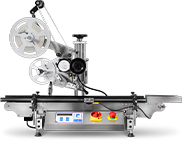
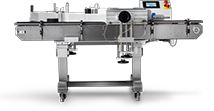
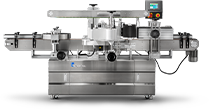
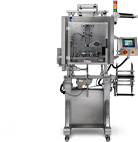
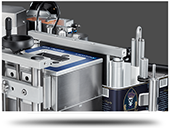
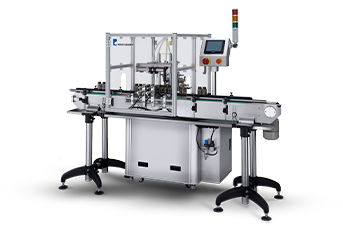
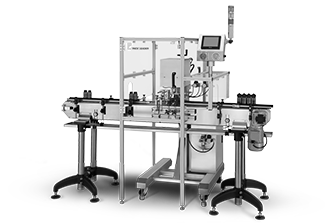
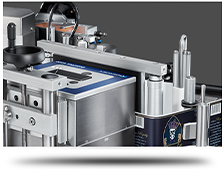
.webp?width=588&height=294&name=TheCraftBrewersGuideToEvaluatingBeerEquipment_Feature%20(1).webp)




.webp?width=360&name=2x-color-logo%20(1).webp)